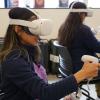
Yoshimi Fukuoka, PhD, RN, FAAN, professor, leads research exploring the power of artificial intelligence to combat today’s urgent health issues.
Can Artificial Intelligence Defeat the Country’s Leading Causes of Death?
ChatGPT. Alexa and Siri. Self-driving vehicles. It may seem that artificial intelligence (AI) is everywhere – and that’s because it is.
But this is nothing new for Yoshimi Fukuoka, PhD, RN, FAAN, professor at the UCSF School of Nursing, whose research explores the power of AI to combat today’s urgent health issues. Fukuoka is leading two AI-based projects and developing health interventions that hold significant promise for the future of AI and health care.
Q. You are leading a project to improve awareness of heart disease among women. Please tell us more about this issue.
Heart disease is the leading cause of death in the United States, responsible for roughly one in every five deaths. Rates of heart disease are improving for men but rising among women.
Despite national education campaigns by the American Heart Association and other federal agencies to improve knowledge of heart disease, women’s awareness and perceived risk of the disease decreased from 65% to 44% between 2009 and 2019. Declines were most significant among Hispanic, African American and young women ages 25-34.
It’s clear that this “one size fits all” approach is not working. We need to personalize heart disease education and awareness for women.
Q. How does AI provide a possible solution?
I am developing a fully automated, AI text-based chatbot to provide educational resources about heart disease to women.
Chatbots using natural language processing are software applications that mimic written and/or spoken human speech for the purpose of simulating a conversation with a real person. An example is Apple’s Siri. They are highly personalized and able to send custom messages.
We will use our chatbot to provide resources tailored to the specific questions and health information submitted by the user. Resources will cover topics such as symptoms, risk factors, recommendations for when to seek a health care provider and more.
We recently pilot tested the algorithms and content that will be used by the chatbot with a group of 171 women. Two-thirds were from diverse racial and ethnic backgrounds. All participants demonstrated improved knowledge and awareness of heart disease. Additionally, 56% of participants noted that they had used a chatbot before. It’s a technology women are already engaged with and comfortable using.
We look forward to testing a fully automated chatbot prototype later this year.

Q. Chatbots provide highly personalized experiences. Are there other benefits?
Chatbots are “always-on,” meaning women can engage with them whenever their schedule allows – 24 hours a day, seven days a week.
AI’s ability to provide on-demand, personalized information to patients has the potential to address racial, gender, and socioeconomic disparities in health care. But that is only possible if the AI program has access to massive amounts of data that are inclusive of diverse groups.
Chatbots collect real-time data constantly, producing very large and diverse data sets. They have the potential to secure the inclusive data we need to advance health equity.
Q. You also study how AI-based interventions address diabetes and obesity. Tell us about that work.
More than one in three U.S. adults have prediabetes. Counseling sessions with clinicians, combined with daily physical activity and diet modifications, have been shown to be effective in helping people lose weight and delay the onset of type 2 diabetes. Unfortunately, this type of personalized weight loss plan is expensive and access is limited.
Utilizing reinforcement learning, a type of machine learning, my colleagues and I created a predictive model to personalize an individual’s weight loss program. Our model is unique in that it incorporates changes in patients’ motivational states, allowing us to predict an individual’s behavior in a weight loss program over time.
The model can determine the optimal number of counseling visits, timing of visits, and the physical activity goals that will help that specific individual meet their weight loss goals. Ultimately, it helps allocate limited resources effectively and efficiently so that more patients can benefit from personalized weight loss plans.
Q. Five years from now, how do you predict AI will impact health care?
AI technologies and approaches are rapidly advancing, and we’re just beginning to see how AI will impact the health professions. Educating health care professionals and health care leaders about AI approaches must be a priority.
My colleague and I are developing a new AI course for the UCSF School of Nursing. Students will learn about introductory AI concepts like machine learning and natural language processing. Throughout the quarter, guest speakers who are leading AI-based research and clinical projects in health care settings will join the course to provide examples of how AI is already being used in health care.
I am also a core faculty member of the new PhD in Computational Precision Health program, an innovative joint program offered by UCSF and UC Berkeley. I offer a particularly unique perspective to the program as the only core faculty member from the School of Nursing.
AI has the possibility to improve care, particularly for individuals with racial/ethnic minority backgrounds and to address gender inequity. It's critical that health care professionals and leaders understand AI concepts – their potential applications and risk mitigation methods in health care – and I am committed to building opportunities for learning.



